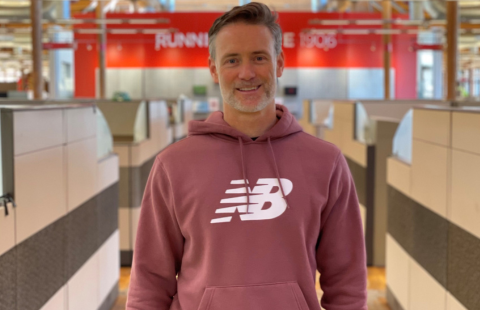
Meet Nick Lunger ’04, senior manager of integrated business planning and inventory management at New Balance. He’s bullish on the supply chain industry—and excited about the momentum behind UNH’s growing supply chain management option.
When Lunger graduated from UNH with a marketing degree, supply chain wasn’t an academic option at the school.
Instead, Lunger started out in marketing and quickly realized he was more analytical than creative — a realization that led him to pursue a master’s in finance and supply chain management.
“I took a class in supply chain just to see what it was about, and it lit a fire in me,” Lunger says. “It showed me the direct connection between planning and getting products on shelves — or even onto an athlete’s feet.”
Today’s Wildcats can begin building their careers in supply chain much earlier thanks to Paul College’s Business Administration: Supply Chain Management option. Lunger is a member of the program’s advisory board and works with his peers in the industry to help shape its direction
“Because of the lack of a true academic understanding of supply chain, there is a huge need for talent in the industry. If you're from my generation, you most likely fell into the industry, like me,” Lunger says. “Now, students can come out of college or secondary school with an understanding of the philosophy of supply chain and bring a whole new skill set to the industry."
Building A Career in Supply Chain
Lunger started his career at Procter & Gamble before joining New Balance, where he's spent the last 15 years growing with the company and watching it transform. He says the best part of his job is seeing people with New Balance products, knowing that he played a part in getting those products into consumers' hands.

Working in supply chain has also given Lunger opportunities he never imagined possible.
"One of the first moments that made me realize how much I loved my job was traveling to Asia and seeing firsthand how our planning impacts factories,” Lunger says. “Driving four hours from Ho Chi Minh City into Cambodia on dirt roads, passing cows, and arriving at a factory in the middle of the jungle was incredible, and then I’m sitting at a table with people I never would have had the opportunity to meet otherwise and collaborating on how we could be more successful together.”
Another highlight was seeing Olympic gold medalists Sydney McLaughlin and Gabby Thomas sprint to wins at the 2024 Summer Olympics, while wearing New Balance shoes his team had helped deliver to Paris.
“We made that happen,” Lunger says. “We had product managers go to Asia, grab their shoes, and then fly them to Paris and give them the shoes.”
What a Career in Supply Chain Looks Like
Lunger describes supply chain as a mix of science, technology, and art — built on three core pillars:
- Plan: Figuring out what products are needed, how many, and when.
- Make: The actual production — building or creating the product.
- Deliver: Getting the product to the customer quickly and reliably.
“The day-to-day life of a supply chain professional really depends on what you enjoy,” Lunger says. “If you want to be on the factory floor or travel, those opportunities exist. If you're more into numbers or planning behind the scenes, there's space for that too. And if you're into tech, there's tons of opportunity in AI, machine learning, and digital tools being implemented across the industry.”
In his own work, supply chain is key to staying ahead of fast-changing fashion trends.
“We’re a fashion company driven by performance — and that’s where supply chain plays a critical role,” Lunger says. “We need to react quickly to fashion trends. In today’s world of TikTok and YouTube, what’s ‘cool’ is often dictated by algorithms. Our job is to make sure the right products are in the right place at the right time.”
Why Supply Chain Skills Are in High Demand
Lunger doesn’t see supply chain opportunities slowing down anytime soon. The COVID-19 pandemic underscored the critical need for supply chain planning, and with ongoing technological advancements and global disruptions, the industry remains as essential as ever.
For students considering supply chain, Lunger recommends complementing their coursework with analytics, marketing, and finance courses.
“I see supply chain as the engine that turns marketing ideas into reality. Marketing defines the brand’s vision — supply chain makes it happen,” Lunger says. “If you want to succeed in supply chain, take time to understand how companies market and finance their products. The more you understand those connected areas, the better equipped you’ll be to make an impact.”